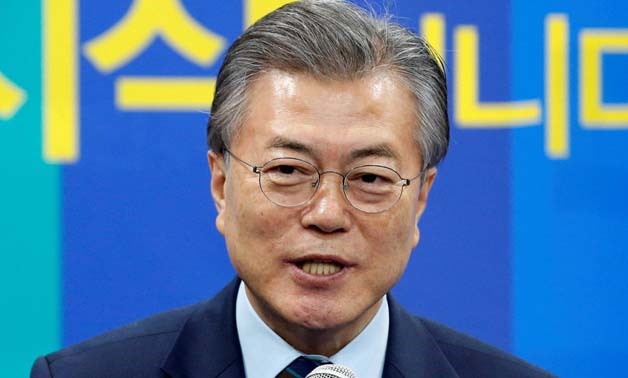
South Korean President Moon Jae-In - Reuters
Seoul - 17 July 2017: South Korea on Monday offered to hold rare military talks with North Korea, aiming to ease tensions after Pyongyang tested its first intercontinental ballistic missile.
The offer of talks, the first since South Korea elected dovish President Moon Jae-In, came as the Red Cross in Seoul proposed a separate meeting to discuss reunions of families separated by the 1950-53 Korean War.
The South's defence ministry proposed a meeting to be held on Friday at the border truce village of Panmunjom, while the Red Cross offered to hold talks on August 1 at the same venue.
If the government meeting goes ahead, it will mark the first official inter-Korea talks since December 2015. Moon's conservative predecessor Park Geun-Hye had refused to engage in substantive dialogue with Pyongyang unless it made a firm commitment to denuclearisation.
"We make the proposal for a meeting... aimed at stopping all hostile activities that escalate military tension along the land border," the defence ministry said in a statement.
The Red Cross said it hoped for "a positive response" from its counterpart in the North in hopes of holding family reunions in early October. If realised, they would be the first for two years.
Millions of family members were separated by the conflict that sealed the division of the two countries. Many died without getting a chance to see or hear from their families on the other side of the heavily-fortified border, across which all civilian communication is banned.
With the passage of time, the number of survivors has diminished, with only around 60,000 members of divided families still left in the South.
"North Korea should respond to our sincere proposals if it really seeks peace on the Korean Peninsula", Cho Myoung-Gyon, Seoul's unification minister in charge of North Korea affairs, told reporters.
Cho stressed that Seoul "would not seek collapse of the North or unification through absorbing the North", and urged Pyongyang to restore cross-border communication channels including a shuttered military hotline.
Moon, who took power in May, has advocated dialogue with the nuclear-armed North to bring it to the negotiating table and vowed to play a more active role in global efforts to tame the South's unpredictable neighbour.
But Pyongyang has staged a series of missile launches in violation of UN resolutions -- most recently on July 4 when it test-fired its first ICBM, a move which triggered global alarm and a push by US President Donald Trump to impose harsher UN sanctions.
Washington has also called on China, the North's sole ally, to put more pressure on Pyongyang to curb its nuclear ambitions, which have advanced rapidly under leader Kim Jong-Un.
The latest ICBM test -- which Kim described as a "gift" to the Americans -- was seen as a milestone in Pyongyang's quest to build a missile capable of carrying a nuclear warhead that can hit the US mainland.
China's foreign ministry welcomed Seoul's peace gesture, saying it hopes "the two sides will move in a positive direction to... break up the stalemate and to relaunch the dialogue and negotiations".
China is reluctant to pressure the North too far for fear of regime collapse. It is worried about an influx of refugees and possible US troops stationed on its border in an unified Korea.
The proposed meetings would be a "rare opportunity to ease tension that has built up for 10 years", said Cheong Seong-Chang, of the South's Sejong Institute think tank.
"It would at least help let off some steam out of the current crisis, although the North would still maintain that it would not give up its weapons programmes," he said.
The agenda for the military meeting could include moves to suspend propaganda campaigns operated on both sides of the border for years, Cheong added.
The South's military has deployed dozens of giant loudspeakers along the tense border to blare out a mix of world news, K-pop songs and other propaganda targeting young North Korean soldiers.
The military has also occasionally launched giant balloons containing anti-Pyongyang leaflets across the border.
The North has responded with its own propaganda broadcasts and sent anti-Seoul leaflets via giant balloons across the border.

Comments
Leave a Comment